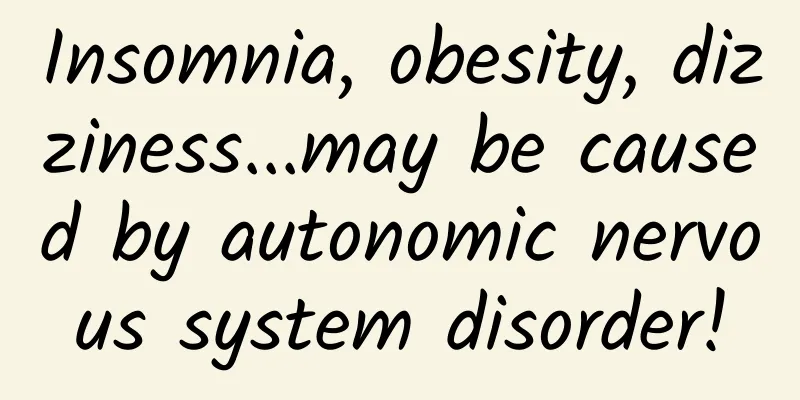Insomnia, obesity, dizziness...may be caused by autonomic nervous system disorder!

|
If you want to regain your slim figure and get rid of accumulated fat, you have to start by balancing your autonomic nervous system. Many people's obesity is not caused by eating too much, but by autonomic nervous system disorders. This type of obesity can be divided into two types: stress-induced overeating obesity and calorie metabolism-induced obesity. Stress-induced obesityWhen the human body faces stress, the physiological mechanism will automatically mobilize the protein stored in the muscles to respond, and at the same time secrete "stress hormones" - adrenaline, norepinephrine and cortisol. The first two are good at dealing with short-term stress, while the latter is accustomed to fighting long-term stress. The main function of cortisol is to send a signal to the brain to "store fat". In other words, if you are under stress for a long time, your physiological mechanism will automatically store fat, and your body fat percentage will naturally increase. The worse news is that cortisol also prompts gastric cells to secrete ghrelin, which makes us feel never full no matter how much we eat, and we always mistakenly think that we are "very hungry, very hungry", and finally engage in uncontrolled binge eating behavior. Your body keeps storing fat and constantly tells you to eat. How can you not get fat? Regardless of whether the autonomic nervous system disorder is caused by excessive stress, or the autonomic nervous system disorder leads to a decrease in stress resistance, it is recommended that you regulate your autonomic nervous system, fight off the "increased appetite" phenomenon, improve your stress tolerance to stop muscle consumption, and there is hope for losing weight. Caloric metabolic obesity"If you gain weight while breathing, you should highly suspect that it is calorie metabolism-type obesity." In the clinic, in addition to obesity caused by overeating, calorie metabolism-type obesity is also common. Simply put, calories "only come in but not out", so you will gain weight even if you eat less. These people all have the following characteristics: disordered rhythm of life, irregular meals, and repeated dieting to lose weight. Why does heat only go in but not out? The main reason is metabolic disorder. Our bodies have their own rhythms, and they follow standards for when to replenish calories (eat), when to consume calories, and how much calories to consume. However, when the rhythm of life is disrupted and the established rhythm is destroyed, people eat and drink a lot when they should not, and starve themselves when they should replenish energy. In order to ensure that there are enough calories available, the body has to shut down part of its metabolism and conserve as much calories as possible. Ultimately, calories only go in but not out, and people naturally get fatter and fatter. The human body's metabolic mechanism is regulated collaboratively by the endocrine system and the nervous system. Among them, the autonomic nervous system is part of the nervous system, and its commander is the hypothalamus, which in turn assists the pituitary gland in regulating the secretion of various hormones. Autonomic nervous system disorders are bound to affect the function of the hypothalamus, and indirectly the endocrine system will also be affected, causing endocrine disorders. This is why autonomic dysfunction can lead to caloric obesity. People who lead busy lives and have irregular daily routines are potential risk factors for calorie metabolism-type obesity. As the saying goes, "A three-foot-thick illness does not form overnight." Endocrine disorders are not something that happens overnight. If you want to get rid of calorie metabolism-type obesity, you need more patience and time. Adjust your work and rest schedule and diet, and slowly get your autonomic nervous system back on track, and endocrine disorders and obesity will be solved. Our hospital currently provides autonomic nerve examinations and you can consult Dr. Wu Peiquan from the psychiatry department. Bariatric Surgery and Physical and Mental AssessmentMany people ask: "Why do we need to arrange a psychiatrist for evaluation during bariatric surgery?" There are several main reasons: Assess the individual’s cognitive function to see if it affects the individual’s ability to understand the surgery and the process and to make decisions. Whether you have eating disorders, anxiety, insomnia, and autonomic nervous system disorders will affect your compliance with weight loss surgery and the effectiveness of weight maintenance after surgery. Assess family and social support. Weight loss can be maintained for a long time only if family and social support is good. Combining the above three items, we can roughly assess the postoperative cooperation, physical and mental adaptation ability and expected weight loss results of the patients who intend to undergo surgery. in conclusion Past domestic and international literature has pointed out that obesity is related to poor physical and mental conditions. About 40% of people who want to undergo weight loss surgery have some physical and mental conditions, the most common of which are insomnia, depression, anxiety, and eating disorders (such as bulimia). Recognizing the above problems in individuals before surgery and providing timely treatment can effectively improve the quality of care during surgery and have a profound impact on the effectiveness of weight loss surgery. For example, according to a study from the University of Chicago, staying up late and sleeping less for four nights can reduce the sensitivity of the body's fat cells to insulin by 30%. Once the sensitivity of fat cells decreases, the production of leptin will decrease, making the body unable to control appetite and energy consumption efficiency worse, ultimately leading to more and more fat. Eating habits are another important factor in the preoperative assessment of weight loss surgery. The absence of binge eating behavior can better predict a good weight loss effect after surgery. Because the stomach capacity immediately becomes smaller after weight loss surgery, but the brain of patients with binge eating habits will still tell themselves to eat a lot of food according to previous memories, which will affect the postoperative effect of weight loss surgery. Therefore, if preoperative assessment shows eating disorders, or if the patient is used to relaxing by eating a lot, it is recommended to start relevant treatment before surgery to reduce postoperative discomfort and promote postoperative weight maintenance. Therefore, a psychiatrist is arranged to conduct a pre-operative physical and mental assessment in the hope of helping the individual achieve a physical and mental balance and improve the effectiveness of the weight loss surgery. So the next time a bariatric surgery patient is referred for a physical and mental evaluation, don’t worry about or reject the evaluation. |
Recommend
What medicine can I take for bacterial vaginosis?
Bacterial vaginitis can be treated by taking drug...
Can vulvar itching be cured by traditional Chinese medicine?
In clinical practice, there are many ways to trea...
Six tips to protect your pelvis
In life, people often neglect small problems and ...
9 kinds of snacks to satisfy hunger, healthy edamame and boiled eggs are on the list
Office workers work at a fast pace, and sometimes...
The harm of subserosal uterine fibroids Will subserosal uterine fibroids affect childbirth?
What are the hazards of subserosal uterine fibroi...
Experts analyze the causes of recurrence of cervical erosion
There are many ways to treat cervical erosion, bu...
Which gynecological hospital in Shenyang is recommended?
Which gynecological hospital is good in Shenyang?...
How long after medical abortion can you have sex? What are the precautions after medical abortion?
Medical abortion is just like natural childbirth,...
What are the types of female cervical erosion? Detailed description of the corresponding symptoms of different types of cervical erosion
In life, cervical erosion is a complex disease th...
Introduction to the treatment of three common adnexitis
For the treatment of adnexitis, of course, the so...
What should I do after discovering uterine fibroids?
Uterine fibroids are benign tumors that grow in a...
The main causes of dysmenorrhea in women
Dysmenorrhea often occurs between women's hol...
Under what circumstances does candidal vaginitis usually occur?
Under what circumstances does candidal vaginitis ...
What to do about habitual miscarriage caused by curettage? There are 4 ways
Because curettage is very harmful to the female b...
How do women differentiate and diagnose cervical erosion? Some common sense in diagnosing cervical erosion
Cervical erosion is a very familiar gynecological...









